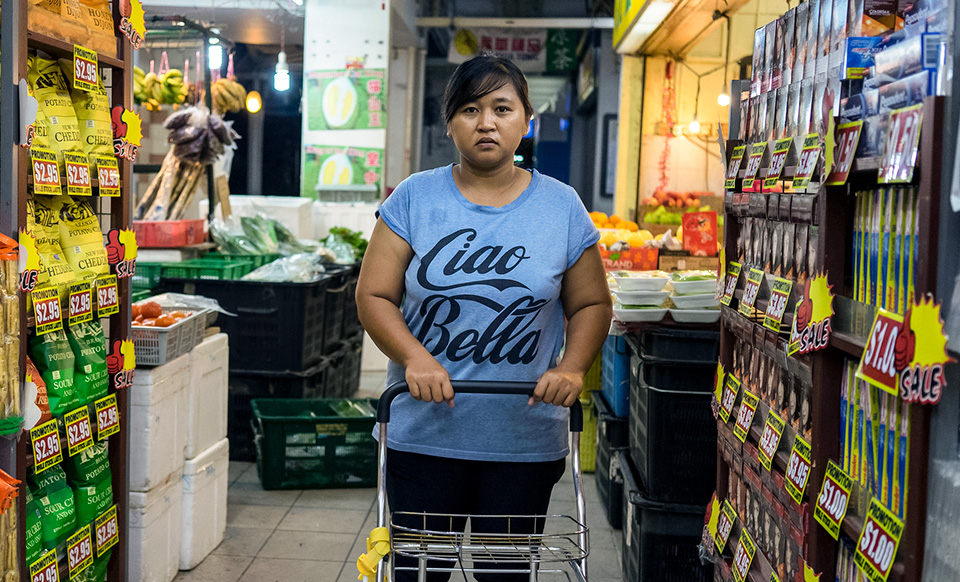Think equal innovate for change
Date:
Authors: Anita Nirody, Sabine Machl and Derval Usher
Jakarta, Indonesia — Arin is a shop attendant at one of the biggest malls in Semarang. She has just moved to the city after graduating from high school and is proud to be a working woman, earning a salary to support herself and her family back in her village. However, she is nervous about navigating a new city at night after she finishes work at 10pm. She feels lucky that the online ojek service (motorbike ride sharing app) - is affordable in Semarang and offers a safe means to go back home, but she still does not always feel secure returning home. Sometimes she gets cat-called while waiting for the ojek to arrive, or the driver asks questions that are too personal.
Her experience is not unique. Many women in Indonesia and beyond face daily risks in navigating public spaces. New technologies and digital innovation can be part of the solution, but they will not fully address women’s needs unless women are part of designing these solutions and their considerations are taken into account. Women have tremendous potential to transform our societies, but unfortunately inequality and violence against women remains among the biggest challenges in realizing this potential.
Every year on 8 March we celebrate International Women’s Day. This year’s theme focuses on innovative ways to advance gender equality and the empowerment of women, particularly by functioning social protection systems, access to public services and sustainable infrastructure. Making the gender equal world envisioned in the Sustainable Development Goals (SDGs) requires innovation in policy-making and implementation to remove the barriers for those who are left farthest behind and those most marginalized.
In Indonesia, women’s participation in the labour force is still low (only around 50 per cent) compared to men (approximately 80 per cent). Women are more often in informal employment, which limits their access to social protection and their productivity and income security could increase if this were changed. In the Asia Pacific region it has been estimated that women spend 4.1 times more time on unpaid care and domestic work than men and this hampers their access to decent jobs.
In 2016, the Ministry of Women's Empowerment and Child Protection commissioned a violence against women survey which was carried out by the Central Statistics Agency and supported by the UN. It showed that one in three Indonesian women have experienced physical and/or sexual violence in their lifetime, regardless of age, education, income and social status.
Violence against women does not just happen in private areas, but also in public spaces. A Safety Audit scoping study conducted in Jakarta in 2017 found that infrastructure and unsafe public transportation are amongst the most common places where harassment and violence against women and girls occurs. In response, the UN and the city government identified areas that can be improved and collaborated with public transportation operators to build the capacity of city government personnel in addressing these issues.
Unfortunately, social norms that normalize violence often discourage bystanders to act which affects women’s choices and mobility and often hinders their ability to participate in public life. Therefore, the UN also works with the Police to develop investigation guidelines for violence cases to ensure appropriate procedures.
Innovation and technology have shown incredible progress touchingIn reality, women often remain excluded from the city development process and rely upon themselves to navigate a city ubiquitously equipped with sensors, mobile apps and alternative transportation options. The UN and Pulse Lab Jakarta collaborated on the “After Dark” research to understand women’s safety and mobility in Medan, Surabaya and Semarang by focusing on women’s individual experience when traveling at night. The research generated insights on women’s strategies to safely navigate public transportation at night and identified opportunities for local government, private sector companies working on transportation as well as bystanders to create safer cities for women.
The United Nations is working with the government, private sector and civil society organizations, to support the Sustainable Development Goals that are focused on ensuring that no one gets left behind. Empowering women and girls are key to achieving the SDGs and when we look at the monumental progress that has taken place in infrastructure development around Indonesia, it will be important that this progress is accessible to all.
Arin, like all of us, has the right to live without fear of violence and free from constraints that limit her options. She must be able to choose career opportunities and excel and reach her full potential without fear of harassment or for her personal safety.
On this International Women’s Day, let us celebrate progress and innovation that create opportunities for women, and also reflect on where more needs to be done including shifting traditional gender roles and strengthening gender-sensitive policies that will expand women and girls’ opportunities to contribute to positive change.
This OP-ED was originally published on Jakarta Post on: 08 March 2019
